
Drax Biomass donates $30,000 to help communities affected by COVID-19 and Easter tornadoes



Severe storms and flooding in the area near Drax in February resulted in damage to the rail tracks. GBRf has been working closely with Drax to reschedule rail deliveries and maximise capacity on the rail link while the repairs are completed – maintaining the vital supplies of biomass needed for Drax to generate enough renewable electricity for up to four million households.
The rail planners who helped rework the timetable to accommodate the new train timings combined forces with train drivers, signal controllers, Network Rail train marshals and Drax logistics specialists to speedily restore flows of sustainable biomass to the power station.
“GB Railfreight is playing its part in supporting the UK’s Covid-19 response by helping to keep essential services running across the country. Our partnership with Drax Power Station in Yorkshire is proof of this. We are delivering vital supplies of sustainable biomass which are transported across the country by rail to Drax, which supplies five percent of the UK’s electricity needs.
“GB Railfreight stops at nothing to get vital supplies from one part of the country to the other – as we saw during the recent floods near Drax. We will be redoubling our efforts to ensure we keep the country going during these trying times.”
“The teams who are working tirelessly across the UK rail freight system and also within our power stations to keep the lights on and keep the country going during this Covid-19 crisis are doing a tremendous job.
“As teams work around the clock to keep generating the power the country needs, their health, safety and wellbeing are vital. Across all our sites we have implemented strategies to reduce the chances of spreading the virus and have operational plans in place to ensure continued delivery of power into the grid.
“GBRf’s rail deliveries are an important part of our global supply chain for sustainable biomass that supports thousands of jobs and has delivered economic growth across the north of England and in the US south.”
“The railway plays a crucial part in keeping Britain running, particularly in these challenging times and strong teamwork across the rail industry is absolutely key in keeping freight services moving.
“Recent flooding in this area brought additional challenges to keeping services moving, however the hard work and dedication of our people has meant that vital supplies of sustainable biomass have continued to be transported.”
-ENDS-
Picture caption:
A GBRf biomass train makes its way from Drax Power Station after February floods. By Chris Davis [Click to view/download]
Selina Williams
Drax Group Media Manager
E: selina.williams@drax.com
T: 07912 230 393
Dan Julian
Cicero/AMO
E: daniel.julian@cicero-group.com
T: 07919 458 407
Founded in 1999 and headquartered in London, United Kingdom, GB Railfreight is the third largest rail freight operator in the United Kingdom, with a turnover expected to exceed £200 million in 2019. GB Railfreight is one of the fastest growing companies in the railway sector and transports goods for a wide range of customers.
For further information, please contact:
GBRF@cicero-group.com
Visit www.gbrailfreight.com
Drax Group’s purpose is to enable a zero carbon, lower cost energy future and in 2019 announced a world-leading ambition to be carbon negative by 2030.
Its 2,900-strong employees operate across three principal areas of activity – electricity generation, electricity sales to business customers and compressed wood pellet production.
Drax owns and operates a portfolio of flexible, low carbon and renewable electricity generation assets across Britain. The assets include the UK’s largest power station, based at Selby, North Yorkshire, which supplies five percent of the country’s electricity needs.
Having converted two thirds of Drax Power Station to use sustainable biomass instead of coal it has become the UK’s biggest renewable power generator and the largest decarbonisation project in Europe.
Its pumped storage, hydro and energy from waste assets in Scotland include Cruachan Power Station – a flexible pumped storage facility within the hollowed-out mountain Ben Cruachan. It also owns and operates four gas power stations in England.
Drax owns two B2B energy supply businesses:
Drax owns and operates three pellet mills in the US South which manufacture compressed wood pellets (biomass) produced from sustainably managed working forests. These pellet mills supply around 20% of the biomass used by Drax Power Station in North Yorkshire to generate flexible, renewable power for the UK’s homes and businesses.
For more information visit www.drax.com
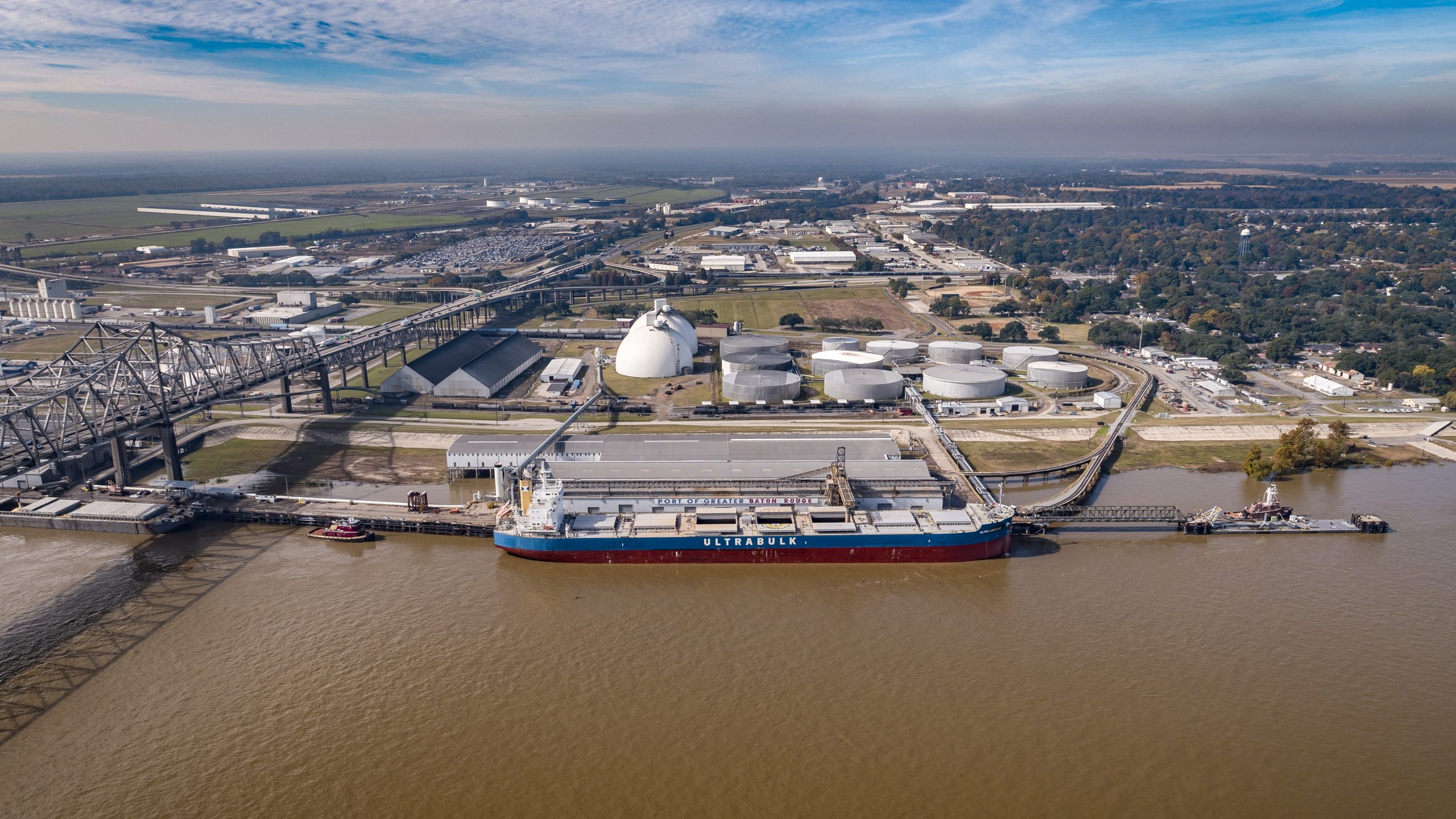
The Port of Greater Baton Rouge is the final deepwater port on the Mississippi River and the closest to Drax’s three pellet plants in the US South. In 2015, Drax completed work on its export facility at the port to process and ship biomass to its power station in the UK.
Ultrabulk’s MV Ultra Jaguar vessel carried 62,846 tonnes of sustainable biomass from Baton Rouge to the UK for Drax. The cargo is enough fuel to generate electricity for around 1.3 million homes.
The landmark shipment, which arrived at ABP’s Port of Immingham on March 25, will help Drax to continue to produce the electricity the UK needs during the Covid-19 crisis.
“We’re very proud of what Drax has achieved since we started using sustainable biomass instead of coal at the power station – by developing a global supply chain for sustainable biomass, our operations support thousands of jobs and have delivered economic growth across the North of England and in the US South.
“Maintaining our supply chain so we can continue to generate the renewable electricity the country needs is all the more important right now as we continue to play a critical role in producing power to help the fight against Covid-19. Our teams are working around the clock to keep generating the power the country needs.”
Baton Rouge Transit has shipped over 5 million tonnes of sustainable biomass to ports on the UK’s east and west coast in the five years since the first vessel was dispatched on April 6th 2015.
Once in the UK, the wood pellets are loaded on to bespoke biomass freight trains bound for Drax Power Station in North Yorkshire, where they are used to generate the renewable electricity that millions of UK homes and businesses rely on.
“In the past five years, the team here at Drax’s Baton Rouge facility has gone from loading its first vessel with 20,000 tonnes of sustainable wood pellets, to the 100th vessel, which loaded almost 63,000 tonnes. The team did this while achieving an industry-leading safety record, underscoring its focus and commitment to the wellbeing of our employees.
“We will continue to work around the clock to maintain consistent and reliable deliveries of sustainable biomass to Drax Power Station – a critical national asset which supplies 12% of the UK’s renewable power. This is especially important during the ongoing Covid-19 crisis. We have plans and processes in place to ensure our key workers can continue to carry out their vitally important roles safely during the Covid-19 pandemic.”
Drax is working closely with its suppliers in North America and Europe, as well as partners in the rail freight sector and at port facilities in the US and UK to maintain a resilient supply chain amid the coronavirus pandemic.
The UK government has identified Drax as critical national infrastructure. This includes the infrastructure and logistics related to the transportation of biomass to the power station, such as ports and rail. The US federal government and most state and local authorities have made similar designations relating to biomass.
Around two thirds of the 7.5 million tonnes of sustainable biomass Drax uses each year comes from the US, where Drax owns and operates three pellet mills producing compressed wood pellets sourced from sustainably managed working forests in Louisiana, Arkansas and Mississippi.
The pellets are sent by rail and truck from the plants in Louisiana and Mississippi to Drax’s Baton Rouge facility before being loaded onto ships for their transatlantic journey.

Vessel loading sustainable biomass at Drax’s Baton Rouge export facility in the US
Drax’s operations support around 5,700 jobs throughout its supply chains across the North of England and help to generate £600m per year for the region’s economy.
Earlier in March, Drax received and unloaded the largest ever shipment of sustainable biomass from Baton Rouge as part of its regular supply chain deliveries.
In addition to its own wood pellet production, Drax also has agreements with a number of other suppliers in the US and elsewhere around the world including in Canada, the Baltics and Portugal as well as multiple trading relationships. This gives the energy company greater flexibility in sourcing sustainable biomass.
ENDS
Ali Lewis
Drax Group Head of Media & PR
E: ali.lewis@drax.com
T: 07712 670 888
Selina Williams
Drax Group Media Manager
E: selina.williams@drax.com
T: 07912 230 393
Annmarie Sartor
Communications Officer – United States
E: annmarie.sartor@draxbiomass.com
T: +1 318-801-0046
Drax Group’s purpose is to enable a zero carbon, lower cost energy future and in 2019 announced a world-leading ambition to be carbon negative by 2030.
Its 2,900-strong employees operate across three principal areas of activity – electricity generation, electricity sales to business customers and compressed wood pellet production.
Drax owns and operates a portfolio of flexible, low carbon and renewable electricity generation assets across Britain. The assets include the UK’s largest power station, based at Selby, North Yorkshire, which supplies five percent of the country’s electricity needs.
Having converted two thirds of Drax Power Station to use sustainable biomass instead of coal it has become the UK’s biggest renewable power generator and the largest decarbonisation project in Europe.
Its pumped storage, hydro and energy from waste assets in Scotland include Cruachan Power Station – a flexible pumped storage facility within the hollowed-out mountain Ben Cruachan. It also owns and operates four gas power stations in England.
Drax owns two B2B energy supply businesses:
Drax owns and operates three pellet mills in the US South which manufacture compressed wood pellets (biomass) produced from sustainably managed working forests. These pellet mills supply around 20% of the biomass used by Drax Power Station in North Yorkshire to generate flexible, renewable power for the UK’s homes and businesses.
For more information visit www.drax.com

It has teamed up with former Cabinet Minister, Rt Hon Justine Greening, as a founding member of the C-19 Business Pledge, a national scheme which encourages employers to join the coronavirus effort by pledging to help their employees, customers and communities to get through the crisis.
“Our dedicated teams across England, Scotland and Wales are working around the clock to continue generating and supplying the electricity the UK needs at this critical time. Through the C-19 Business Pledge we can work with others to go further in supporting those in our communities who need our help more than ever right now.
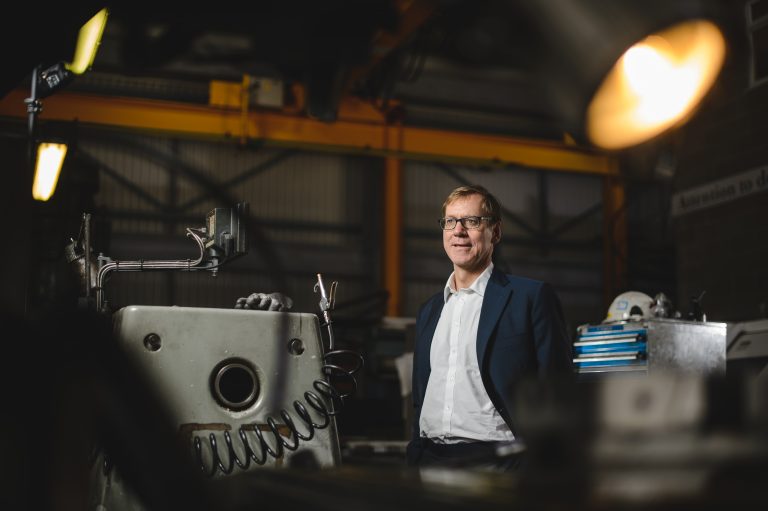
Will Gardiner, CEO, Drax Group
“We want to do as much as we can to help and support our own employees, as well as our customers and the communities in which we operate during this crisis.”
“With the future of many employers hanging in the balance and incredibly tough times unfolding in sectors across the UK, businesses face many incredibly difficult decisions. But those organisations who are able to, like Drax Group, can have a huge role in battling the impact of coronavirus and make a real difference in these uniquely challenging times.
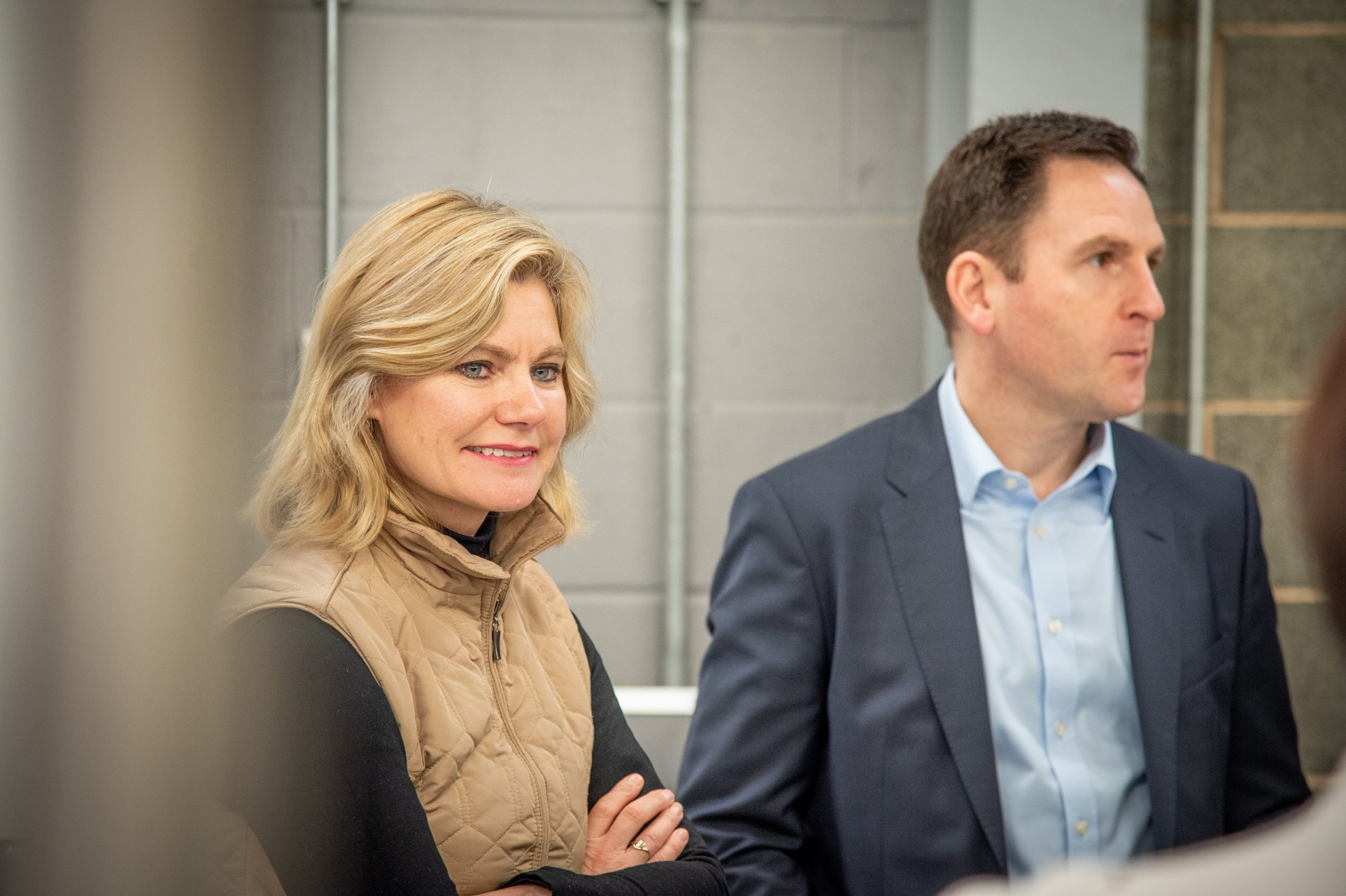
Justine Greening with Drax Generation CEO, Andy Koss
“In spite of everything, lots of employers have already shown amazing initiative and commitment to helping people affected by coronavirus. The C-19 Business Pledge is all about encouraging as many businesses and universities as possible to get involved and then helping them do that faster and better by sharing all the great work that’s already been done. The early response has been incredible and I’ll do everything I can to help to connect up British business to play its role.”
Drax has also delivered 250 facemasks to York Hospital to help keep NHS staff on the frontlines safe.
The masks were donated to Drax Power Station by employees at the Shanghai Waigaoqiao No.3 Power Generation Company in China, part of Shenergy Power Technology. The Chinese energy company’s engineers visited Drax Power Station in North Yorkshire last year, to learn more about how it has transformed itself to become the largest decarbonisation project in Europe by using sustainable biomass instead of coal.
Drax Power Station is the UK’s largest, generating 5% of the country’s electricity.
“We have suffered from the virus in the past two months and know how terrible it is. Thankfully now we are in a much better situation, and we want to help our international friends so that all of us can overcome the virus as soon as possible. We shouldn’t and can’t manage this alone. Although we are from different countries and different cultures, we think we share the belief that life and health are priceless.”
“I would like to express my personal thanks to Drax and their partners in China for their support in donating facemasks to the Trust, to help us ensure we are well equipped to support our staff and care for our patients in the coming days and weeks.”
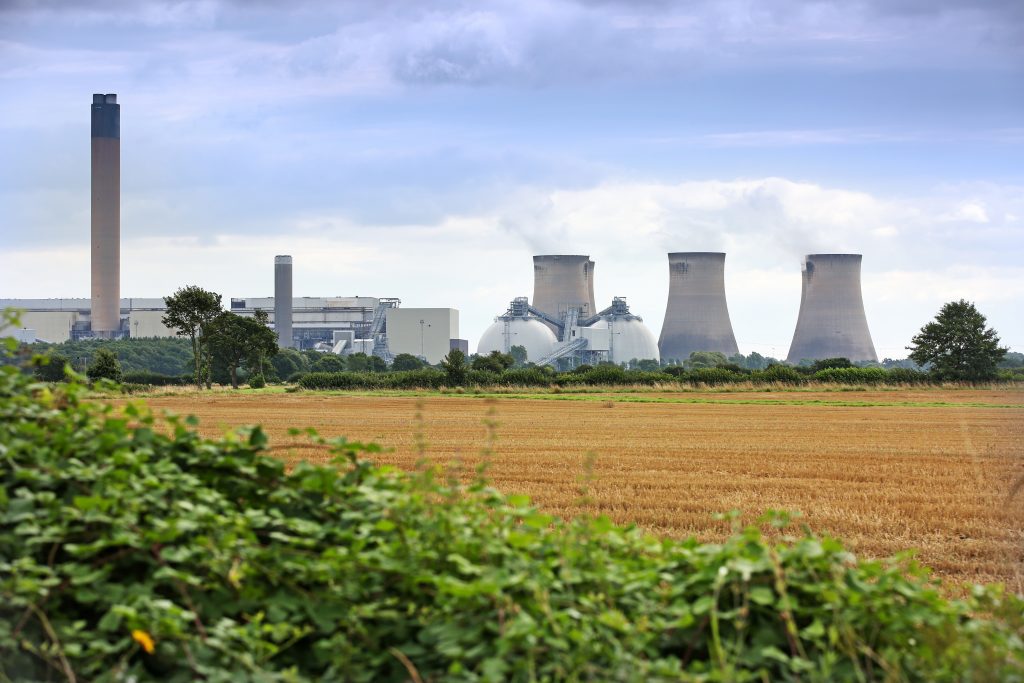
Drax Power Station
“We’re very grateful for the donation of the face masks from our friends in China – it is a great example of businesses working together to help people during this crisis. Through the C-19 Business pledge we aim to support more of those who are most in need.”
The C-19 Business Pledge is targeting not just the immediate challenges of coronavirus, but also the challenges of recovery – and was born out of the huge response from businesses and universities involved in the existing Social Mobility Pledge, wanting to be part of a national effort.
The initiative has already received the backing of employers representing over 900,000 people, staff and students, throughout businesses and universities.
As well as Drax Group, they include BP, Barratt Developments, Everton Football Club, National Grid, DLA Piper, Persimmon Homes and Severn Trent Water.
Employers who sign up to the pledge give their backing to three main objectives built around employees, customers and communities. They will not only help Britain through the immediate challenges of coronavirus, but also through its recovery.
For more on the C-19 Business Pledge visit the website: www.c19businesspledge.org
ENDS
Ali Lewis
Drax Group Head of Media & PR
E: ali.lewis@drax.com
T: 07712 670 888
Aidan Kerr
Drax Group Media Manager
E: aidan.kerr@drax.com
T: 07849 090368
Drax is already a member of the Social Mobility Pledge which aims to champion social mobility and raise aspirations within communities local to its operations.
Employers who sign up to the C-19 Business Pledge give their backing to three main objectives including:
Drax Group’s purpose is to enable a zero carbon, lower cost energy future and in 2019 announced a world-leading ambition to be carbon negative by 2030.
Its 2,900-strong employees operate across three principal areas of activity – electricity generation, electricity sales to business customers and compressed wood pellet production.
Drax owns and operates a portfolio of flexible, low carbon and renewable electricity generation assets across Britain. The assets include the UK’s largest power station, based at Selby, North Yorkshire, which supplies five percent of the country’s electricity needs.
Having converted two thirds of Drax Power Station to use sustainable biomass instead of coal it has become the UK’s biggest renewable power generator and the largest decarbonisation project in Europe.
Its pumped storage, hydro and energy from waste assets in Scotland include Cruachan Power Station – a flexible pumped storage facility within the hollowed-out mountain Ben Cruachan. It also owns and operates four gas power stations in England.
Drax owns two B2B energy supply businesses:
Drax owns and operates three pellet mills in the US South which manufacture compressed wood pellets (biomass) produced from sustainably managed working forests. These pellet mills supply around 20% of the biomass used by Drax Power Station in North Yorkshire to generate flexible, renewable power for the UK’s homes and businesses.
For more information visit www.drax.com
Founded by former cabinet minister, Rt Hon. Justine Greening, and entrepreneur David Harrison, the C-19 Business Pledge aims to harness the power of business as a force for good in tackling the Coronavirus epidemic.
We understand many businesses will be working hard to ensure they are able to continue in this turbulent time. We acknowledge that this will involve difficult decisions.
But for those that can, we are asking them to help in the national effort with their employees, customers and communities. By mobilising that collective effort, we can support those most in need through this crisis.
Our purpose:
To encourage UK businesses and universities to be a force for good by making a commitment to doing what they can to tackle Coronavirus (COVID-19).
These objectives are not only about helping our country get through the immediate challenges of Coronavirus, they are also about the recovery. Business has a crucial role to play in helping to rebuild Britain over the medium to long term.
There are three ways that we believe businesses can have an immediate and long-lasting impact:
1) Employees
Businesses can join the national effort by developing Action Plans to support their own staff throughout and beyond this challenging time. For example, this could include practical support and advice on financial security, mental health, personal wellbeing as well as reintegration back into work for those who have experienced an extended period away from the workplace. For example Severn Trent Water have put clear action plans in place to protect their staff when making home visits and are prioritising vulnerable customers.
More immediately, it should include disseminating the latest NHS COVID-19 advice.
2) Customers
Businesses can join the national effort by publishing clear and simple advice for customers. Where possible they should have specialist teams dedicated to supporting customers if they are having problems, such as those facing repayment difficulties and vulnerable customers, as RBS has done.
This could include prioritising those customers who are isolated and vulnerable, ensuring they do not become disconnected and can easily access services, for example through priority helplines and dedicated support. Others may wish to consider waiving some fees for customers and suppliers who may experience financial difficulties as a result of the Coronavirus.
3) Community
Businesses can join the national effort by committing to help Britain through the Coronavirus epidemic. Over the coming months we are likely to see a sharp increase in isolation, loneliness, mental health and household financial issues in our communities across the country. There will be an increased need for communities to come together with practical support, such as food deliveries, collections and financial assistance for organisations that specialise in supporting vulnerable people.
The way Britain’s businesses work is changing. So too will their relationship with the communities they serve, bringing greater emphasis on grassroots community action.
This could also include support for community projects where they operate, as national wealth management firm True Potential, based in the North East, is doing by providing assistance to local hospices and charities that support the elderly and vulnerable.
The C-19 Business Pledge is driven by the Social Mobility Pledge – a campaign for businesses to be a force for good by delivering a level playing field on opportunity and boosting social mobility in the UK. The Social Mobility Pledge is a growing coalition of over 500 organisations; 450 businesses employing almost 4 million people across the UK, as well as over 50 UK universities representing over 1 million students.
Contact: peter@socialmobilitypledge.org

The Zheng Zhi bulk carrier vessel transported 63,907 tonnes of Drax’s sustainable biomass from the US port of Baton Rouge in Louisiana. The consignment supplies Drax Power Station with enough fuel to generate electricity for 1.3 million homes.
The vessel berthed at Humber International Terminal in the port of Immingham – ABP’s largest terminal, on Friday March 13th.
“Our colleagues here on the Humber are working hard to keep our homes powered, our stores stocked and keeping Britain trading. A huge thank you is deserved for all those working through this time.
“ABP is working around the clock to ensure the wellbeing of employees and customers and the safe continuation of operations.”
“Drax Power Station is critical national infrastructure at the heart of the UK’s energy system and we take this responsibility very seriously, especially now amid the ongoing coronavirus (COVID-19) situation. We are doing everything we can to ensure that we maintain a continuous, stable and reliable electricity supply for millions of homes and businesses in the UK.
“This shipment of sustainable biomass from our pellet mills in the US – the largest yet – highlights the critical role played by infrastructure such as the ports and rail in our supply chain.”

The Zheng Zhi bulk carrier arriving at ABP Immingham. Its cargo of sustainable biomass wood pellets is destined for Drax Power Station — the UK’s biggest renewable power station. Credit: ABP [Click to view/download]
Humber International Terminal employs over 100 people and is the world’s largest biomass handling facility. The terminal is part of the Humber ports that have been working hard, 24 hours a day, in keeping Britain trading.
The Port of Immingham is a vital resource and powers one in ten homes in the U.K.
ENDS
Selina Williams
Drax Group Media Manager
E: selina.williams@drax.com
T: 07912230393
Aidan Kerr
Media Manager – Generation
E: aidan.kerr@drax.com
T: 07849090368
Annmarie Sartor
Communications Officer – United States
E: annmarie.sartor@draxbiomass.com
T: +1 318-801-0046
ABP is the UK’s leading ports operator with 21 ports and other transport related businesses creating a unique national network capable of handling a vast array of cargo.
The company contributes £7.5 billion to the UK economy every year and supports 119,000 jobs. Our current investment programme promises to deliver an extra £1.75 billion for the economy every year.
ABP:
Our five-year investment programme across the group is worth £1 billion. Our investment is designed to respond to the needs of our customers whose business relies on our ports for access to international and, in some cases, domestic markets.
Drax Group’s purpose is to enable a zero carbon, lower cost energy future and in 2019 announced a world-leading ambition to be carbon negative by 2030.
Its 2,900-strong employees operate across three principal areas of activity – electricity generation, electricity sales to business customers and compressed wood pellet production.
Drax owns and operates a portfolio of flexible, low carbon and renewable electricity generation assets across Britain. The assets include the UK’s largest power station, based at Selby, North Yorkshire, which supplies five percent of the country’s electricity needs.
Having converted two thirds of Drax Power Station to use sustainable biomass instead of coal it has become the UK’s biggest renewable power generator and the largest decarbonisation project in Europe.
Its pumped storage, hydro and energy from waste assets in Scotland include Cruachan Power Station – a flexible pumped storage facility within the hollowed-out mountain Ben Cruachan. It also owns and operates four gas power stations in England.
Drax owns two B2B energy supply businesses:
Drax owns and operates three pellet mills in the US South which manufacture compressed wood pellets (biomass) produced from sustainably managed working forests. These pellet mills supply around 20% of the biomass used by Drax Power Station in North Yorkshire to generate flexible, renewable power for the UK’s homes and businesses.
For more information visit www.drax.com
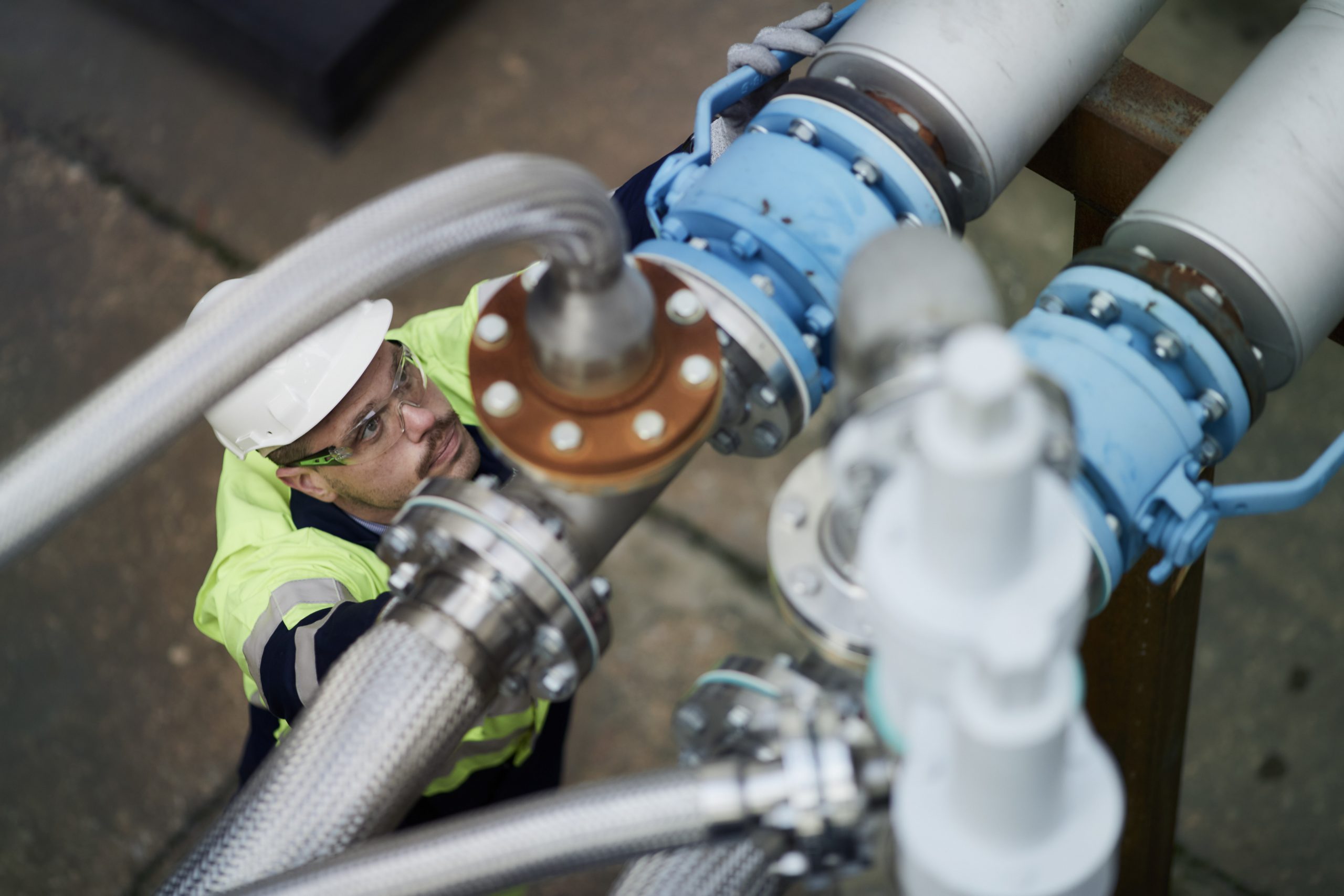
“The funding pledged today for the development of two or more carbon capture and storage clusters demonstrates the government’s commitment to communities and businesses in the North – ensuring the region is well placed to take advantage of new opportunities created by a decarbonising economy.

Drax Group CEO Will Gardiner in the control room at Drax Power Station. Click to view/download.
“By accelerating the development of vital negative emissions technologies like bioenergy with carbon capture and storage (BECCS), which is being pioneered by Drax, we can permanently remove millions of tonnes of CO2 each year from the atmosphere.
“The Humber is the UK’s most carbon intensive region and home to 55,000 jobs in manufacturing and other industries. Decarbonising the Humber would therefore have a major impact – delivering for the environment and the economy, securing jobs and a long-term future for businesses which could otherwise be left behind.”
Innovation engineer inspecting carbon capture pilot projects at Drax Power Station’s CCUS incubation area. View/download.

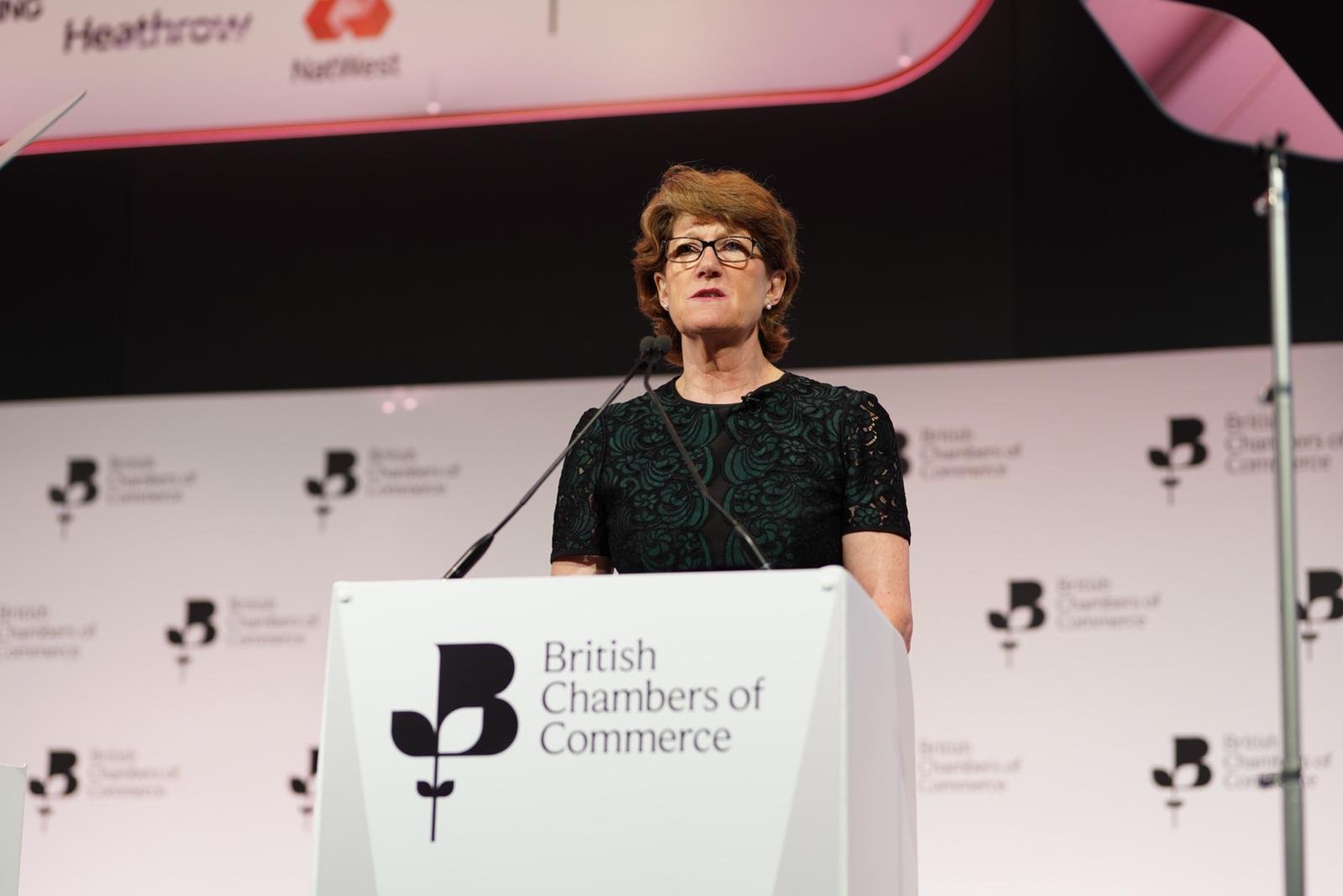
Thank you very much it’s a pleasure to be here again. We meet today in extraordinary times.
Britain is forging a new relationship with countries around the world following our departure from the EU; The climate emergency is gathering pace; with unprecedented weather conditions facing people and business across the country, including on our doorstep at Drax Power Station in Yorkshire. And now we have the Coronavirus – which risks unleashing a medical emergency right around the globe and has already wiped billions off global stock markets. 2020 is set to be a challenging year for British businesses up and down the country.
But it will also, we believe, be a pivotal year for Britain in achieving its net zero emissions targets; Despite all of the challenges we face – this is a year of great opportunity for British business to take the lead in tackling the climate crisis and build a zero-carbon economy. Last week, in a landmark move for Britain’s energy transition, Drax announced that we would stop using coal to generate power after nearly 50 years. We will do so 4 years ahead of the current Government deadline of 2025.
For generations, Drax has been at the heart of Britain’s energy system. We are a strategic national asset, supplying secure, reliable power to more than six million homes and businesses in the North. But we understood a long time ago that coal no longer had a place in our energy system.
So we have embarked on the biggest decarbonisation journey in Europe, transforming the majority of our Power Station at Drax from coal to sustainably sourced, renewable biomass.
We’ve cut our carbon emissions by more than 85% – further and faster than any other energy company in Europe. Today, more than 90% of the power generated by Drax is renewable – allowing businesses like yours to choose power that is both reliable and renewable. But at Drax, we won’t stop there. We want to go further.
That’s why we announced our ambition to be carbon negative by 2030. In fact, Drax was the first company in the world to announce this ambition at the UN climate change conference in Madrid last year.
Since then, Microsoft – and many others – have followed us with similar pledges.
Let me tell you how we will get there. We are using pioneering British technology to capture carbon from bioenergy. In doing so, we are taking carbon out of the atmosphere and creating negative emissions.
Today, we are already capturing one tonne of carbon per day, but with the right investment we could be capturing up to 16 million tonnes every year. Think of that – negative emissions. On a huge scale. The UN and Committee on Climate Change tell us negative emissions will be vital if the UK is to reach net zero emissions by 2050. This is an exciting opportunity for Drax and the UK. And It is also a huge opportunity for British businesses and communities in the North, too.
At Drax, we are working with businesses from around the country to explore how to use carbon in new ways. We’re working with Econic – a cleantech company – to remove oil from plastic production. We’re working with Deep Branch Bio to create proteins that feed animals and plants. And we’re having discussions with airlines and Heathrow about decarbonising the aviation industry with renewable jet fuel.
Scaling up our carbon capture project will help the UK’s biggest industrialists in the Humber reduce their emissions and continue to prosper. A Zero Carbon Humber by 2040 – that is our vision. This would transform the economic outlook of the region, which already contributes £18bn towards the UK economy each year and supports over 55,000 manufacturing jobs alone.
By decarbonising the region, we will protect the businesses that form part of the supply chain for energy intensive industries, as well as establishing new ones. Not since the first industrial revolution has the Humber had this world leading opportunity.
Our vision is to put the Humber – the UK’s most carbon intensive industrial region – back on the global stage as an example to the rest of the world of climate leadership in action, creating green jobs and clean growth.
We are working with academics at leading universities who are helping to create new businesses, new innovations and new products. Through forging these partnerships, we can protect and grow new supply chains to support the green economy.
Next week the Chancellor is due to deliver his first budget. This is the first major opportunity for government to demonstrate its commitment to ‘levelling up’ the economy by investing in infrastructure in the North and tackling the climate emergency. Our message to the Chancellor is clear – support for the Zero Carbon Humber project will help secure the future of our biggest industrial cluster and put the UK on the map as a global leader in the fight against climate change.
At the heart of our ambition to decarbonise the Humber are jobs and businesses. We must ensure people are equipped with the skills they need for the green jobs of the future.
That’s why we are spearheading a Zero Carbon Skills Taskforce, which will bring together employers, government, unions, academia and others to ensure that the journey to net zero provides jobs for the future.
Right now the future seems challenging and uncertain. But at Drax we are optimistic. We know that with the right support we can meet our climate targets and boost our economy at the same time.
We can help build workforces that are equipped to meet the demands of a green economy by boosting skills and opportunity.
And as Britain seeks to secure its place in the world – we can seize the opportunities of infrastructure and new technology investment that will put our country and our businesses at the heart of a global green economy.
Thank you.

“By investing in the skills and new technologies needed to get the country to net zero, businesses can be world leading, creating new opportunities to develop and grow.”
Drax has announced a world-leading ambition to be carbon negative by 2030 by pioneering bioenergy with carbon capture and storage (BECCS) – a ground-breaking negative emissions technology which is essential if the UK is to meet its climate targets.
It is also spearheading a zero-carbon skills taskforce in the North, aimed at ensuring the region has a workforce which is ready to reap the rewards of a net zero economy.
“Despite all of the challenges we face – this is a year of great opportunity for British business to take a world leading role in tackling the climate crisis.”
She added: “We can seize the opportunities of infrastructure and new technology and investment that will put our country and our businesses at the heart of a global green economy.”
Through the Zero Carbon Humber initiative, being delivered in partnership with National Grid Ventures and Equinor, Drax aims to establish the world’s first net zero industrial cluster by 2040.
The Humber is the UK’s biggest industrial region employing 55,000 people in energy, manufacturing and engineering and as the most carbon intensive region in the country – taking steps to decarbonise the area would make a more significant impact on addressing the climate crisis than anywhere else in the UK.
“Our vision is to put the Humber back on the global stage as an example to the rest of the world of climate leadership in action, creating green jobs and clean growth,” she said.
“As the world’s attention turns to Glasgow and the COP26 conference this Autumn, there is no better time for government to show its support for British businesses and the British technology that is leading this fight.”
-ENDS-
Ben Wicks
Media Manager
E: ben.wicks@drax.com
T: 07761 525 662
Drax Group’s purpose is to enable a zero carbon, lower cost energy future and in 2019 announced a world-leading ambition to be carbon negative by 2030.
Its 2,900-strong employees operate across three principal areas of activity – electricity generation, electricity sales to business customers and compressed wood pellet production.
Drax owns and operates a portfolio of flexible, low carbon and renewable electricity generation assets across Britain. The assets include the UK’s largest power station, based at Selby, North Yorkshire, which supplies five percent of the country’s electricity needs.
Having converted two thirds of Drax Power Station to use sustainable biomass instead of coal it has become the UK’s biggest renewable power generator and the largest decarbonisation project in Europe.
Its pumped storage, hydro and energy from waste assets in Scotland include Cruachan Power Station – a flexible pumped storage facility within the hollowed-out mountain Ben Cruachan. It also owns and operates four gas power stations in England.
Drax owns two B2B energy supply businesses:
Drax owns and operates three pellet mills in the US South which manufacture compressed wood pellets (biomass) produced from sustainably managed working forests. These pellet mills supply around 20% of the biomass used by Drax Power Station in North Yorkshire to generate flexible, renewable power for the UK’s homes and businesses.
For more information visit www.drax.com